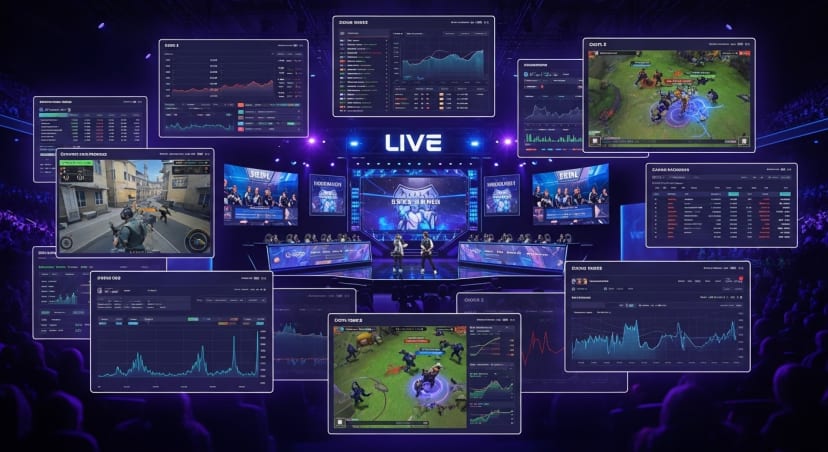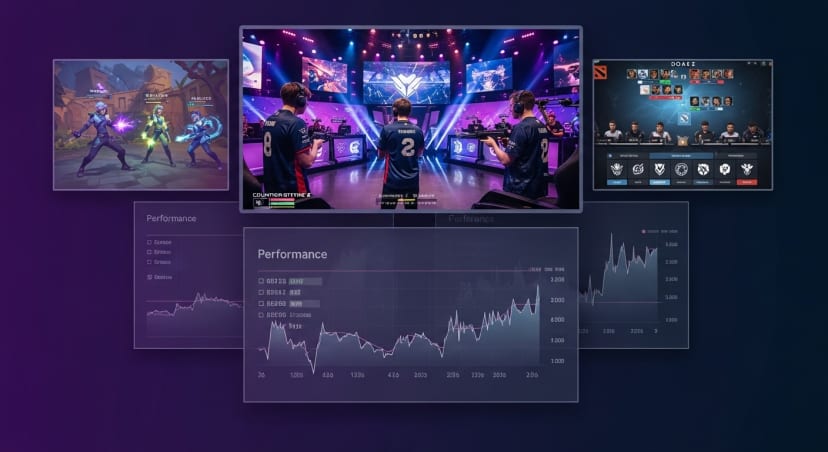AI in Esports Betting: Can Algorithms Really Predict the Game?

Esports and chaos often go hand-in-hand. One week, a team might be dominating, and the next, they could be getting swept. The meta shifts overnight, balance patches rewrite power dynamics, and player performance can swing wildly from match to match. In such a volatile environment, it's no surprise that both platforms and bettors are seeking anchors for their decisions, and increasingly, that anchor is artificial intelligence. For players in the Philippines, understanding this evolving landscape is key.
The combination of AI and esports is happening now because both worlds speak a common language: data. Esports generates massive, structured datasets, from kill counts to pick-ban rates, at a pace far exceeding traditional sports. At the same time, AI systems thrive on fast, repeatable inputs.Betting platforms use this to adjust lines and detect patterns; bettors use it to uncover edges and simulate matchups. It’s a natural collision of high-frequency data and machine learning.
But in a space where unpredictability is part of the appeal, the question remains: can AI actually give you an edge, or is it just high-tech guesswork dressed up as strategy? Let’s break down what AI is doing in esports betting right now, how it works, where it fails, and how Filipino bettors can use it wisely without falling into the trap of blind trust.
How Esports Betting Platforms in the Philippines Use AI
Esportsbooks leverage AI to analyze massive volumes of match data and adjust betting lines in real time. Models track map win rates, draft trends, tempo shifts, and patch impact to simulate thousands of possible outcomes. This helps platforms price odds more efficiently, manage risk, and detect suspicious betting behavior. Unlike traditional sports, esports generates faster, deeper data, which makes AI integration not just beneficial, but essential for platforms serving the Philippine market. Whether it’s League of Legends or CS2, AI is now quietly running behind the odds you see, helping platforms keep pace with the speed and complexity of modern esports betting.
How Filipino Bettors Can Utilize AI in Esports
Bettors in the Philippines can utilize AI to identify market inefficiencies, compare sportsbook lines, and analyze team data more effectively than manual research allows. Some opt for third-party prediction tools, while others develop their own models, trained on kill stats, draft patterns, or map histories. AI can flag potential value bets or anomalies, but astute bettors still validate these insights with their own contextual knowledge. The goal isn't blind prediction; it's informed filtering. With fast-moving tournaments and constant patch cycles in popular esports titles, AI provides bettors with a way to stay ahead, not by guaranteeing outcomes, but by narrowing their focus and adding structure to an otherwise volatile betting landscape.
What's Actually Powering These Esports Predictions?
Most AI tools in esports betting rely on a combination of machine learning models. These models are trained to process thousands of data points from past matches, then apply those learnings to current and future matchups.
The most common approach is supervised learning, where historical data, like kills, map bans, and win rates, is used to train a model to predict likely outcomes. Neural networks can also be employed to evaluate more complex relationships, such as how different champion matchups influence lane control or how economy management correlates with win rates on specific maps.
Some models even simulate thousands of potential outcomes, offering insights that can expose weaknesses across different types of bets in esports, especially when odds are slow to adjust. In theory, this gives bettors a chance to spot favorable matchups or market inefficiencies, but only if they understand the model’s logic and limitations.
AI Esports Betting: Pro & Cons
Despite the buzz, AI in esports betting has real and unavoidable weaknesses. First, there’s the pace of change. Esports titles are patched constantly. A single update can redefine win conditions, invalidate previous data, and scramble team strategies overnight. Models trained on yesterday’s data can’t adjust instantly.
Second, there’s the human factor. Algorithms can’t read tilt, overconfidence, or burnout. They can’t account for a player losing form after a long travel schedule or underperforming in front of a live crowd. These are intangibles, and they matter just as much as stats.
And then there’s data inconsistency. Not all regions or teams generate structured, complete datasets. Some lower-tier matches are poorly documented. Roster swaps, role changes, or mid-split substitutions may not be reflected until after the results are in. Incomplete inputs lead to incomplete predictions.
The primary benefits of AI in esports betting are speed and scale. It can process massive volumes of match data, such as kill statistics, agent picks, and map trends, far faster than any human can. AI helps bettors and platforms surface trends, flag value opportunities, and reduce emotional bias. It’s not about certainty; it’s about clarity in a fast-moving, data-heavy space. When used correctly, it turns noise into a signal.
Ultimately, an AI model is only as good as the data it’s trained on, and in esports, that data is frequently noisy, fast-changing, or incomplete.
| Pros | Cons |
| Analyzes huge datasets quickly | Can’t adapt instantly to patch changes |
| Detects trends and value bets early | Doesn’t account for player psychology |
| Adds discipline, reduces emotional bias | Relies on incomplete/inconsistent data |
| Enhances decision-making, not replaces it | Models degrade fast in volatile metas |
How to Use AI Betting Tools Without Getting Burned
If you’re betting on esports with AI assistance, the smartest thing you can do is treat it as a tool, not a shortcut.
Use models to identify matchups that appear off or to uncover long-term trends in team performance. Let AI highlight potential value, then do the work to validate that insight. Did a team’s win rate spike because of a favorable patch? Has a recent roster move altered the play style in a way that the model isn’t yet accounting for?
The key is knowing when to trust the data and when to trust your instincts. Follow the patch cycle. Watch games. Track map picks and drafting patterns. AI can help you see faster, but it can’t see everything. And when the stakes rise, playoff matches, LAN finals, high-pressure series, it’s often the human side of the game that decides outcomes, not statistics.
When used correctly, tools and analytics for esports betting can help you identify value, but they should never replace your understanding of the scene.
Final Take: AI Is the Edge, Not the Answer
AI isn’t going to hand you guaranteed wins. It can’t outguess every patch, every role swap, or every flash of brilliance from a star player. However, when used wisely, it can help you become a more informed and disciplined bettor.
Think of it like this: the model gets you halfway. It spots the opening. Your job is to confirm the angle, double-check the assumptions, and time the move.
The future of esports betting isn’t AI replacing bettors, it’s AI enhancing them. If you stay sharp, stay skeptical, and combine these tools with advanced esports betting strategies, you'll have an edge no model can replicate.
FAQ
What role does AI play in esports betting in the Philippines?
AI analyzes huge amounts of esports data—like kill/death ratios, hero pick rates, and map strategies—to help betting sites set real-time odds. It also helps Filipino bettors spot good bets by finding patterns and predicting match results. It makes betting faster and more organized.
How do esports platforms use AI to set odds for Filipino bettors?
Platforms use AI to track things like map win rates, team strategies, and how game updates affect play. This helps them predict match outcomes and set more accurate odds, manage risks better, and find suspicious betting activity.
How can Filipino bettors use AI to improve their esports bets?
Bettors can use AI tools to find betting opportunities, compare odds from different sites, and analyze team stats faster. But smart bettors should also use their own knowledge to check AI predictions, instead of just blindly following them.
What kinds of AI models are used to predict esports bets?
Most models use machine learning, trained with past data like kills, bans, and win rates. Some use neural networks to understand complex things like hero matchups or in-game economy. Some even simulate thousands of matches to find good betting chances.
What are the main benefits of using AI for esports betting in the Philippines?
AI can quickly process lots of data, find new trends and good bets early, reduce emotional betting, and make decisions more carefully. It makes things clearer in a fast-changing, data-heavy world, but it doesn't guarantee wins.
What are the downsides of using AI in esports betting?
AI can struggle with sudden game updates, can't understand human factors like player feelings or stress, and relies on data that's often incomplete, especially from smaller leagues or regions.
How should Filipino bettors use AI tools wisely?
Think of AI as a helper, not a magic solution. Use it to find interesting matchups or trends, then check with game updates, team changes, and live game watching. Combining AI with your own knowledge is key.
Can AI replace human knowledge in esports betting?
No. AI is fast and can process data well, but esports depends on human things like player performance, team spirit, and strategy changes that AI can't fully understand.
What's the best way to think about using AI in esports betting?
See AI as a tool that helps you find good bets by spotting opportunities. Your job is to confirm those opportunities, understand the situation, and bet at the right time. The future is in bettors who use AI to help them, not replace them.
















